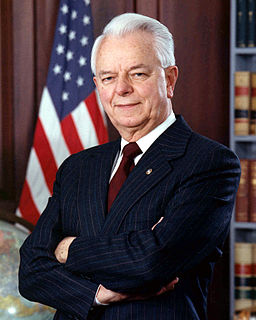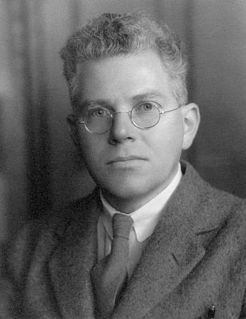A Quote by Wesley Clark
There's no question that Saddam Hussein is a threat Yes, he has chemical and biological weapons. He's had those for a long time. But the United States right now is on a very much different defensive posture than we were before September 11th of 2001 He is, as far as we know, actively pursuing nuclear capabilities, though he doesn't have nuclear warheads yet. If he were to acquire nuclear weapons, I think our friends in the region would face greatly increased risks as would we.
Quote Topics
Acquire
Actively
As Far As
Before
Biological
Biological Weapons
Capabilities
Chemical
Defensive
Different
Face
Far
Friends
Greatly
Had
Hussein
Increased
Know
Long
Long Time
Much
No Question
Now
Nuclear
Nuclear War
Nuclear Weapons
Our
Posture
Pursuing
Question
Region
Right
Right Now
Risks
Saddam
Saddam Hussein
September
September 11
September 11th
States
Than
Think
Those
Though
Threat
Time
United
United States
Very
Weapons
Were
Would
Yes
Related Quotes
There is no question that Iraq possesses biological and chemical weapons and that he [Saddam Hussein] seeks to acquire additional weapons of mass destruction, including nuclear weapons. That is not in debate. I also agree with President Bush that Saddam Hussein is a threat to peace and must be disarmed, to quote President Bush directly.
I come to this debate, Mr. Speaker, as one at the end of 10 years in office on the Permanent Select Committee on Intelligence, where stopping the proliferation of weapons of mass destruction was one of my top priorities. I applaud the President on focusing on this issue and on taking the lead to disarm Saddam Hussein... Others have talked about this threat that is posed by Saddam Hussein. Yes, he has chemical weapons, he has biological weapons, he is trying to get nuclear weapons.
What is the only provocation that could bring about the use of nuclear weapons? Nuclear weapons. What is the priority target for nuclear weapons? Nuclear weapons. What is the only established defense against nuclear weapons? Nuclear weapons. How do we prevent the use of nuclear weapons? By threatening to use nuclear weapons. And we can't get rid of nuclear weapons, because of nuclear weapons. The intransigence, it seems, is a function of the weapons themselves.
The last UN weapons inspectors left Iraq in October of 1998. We are confident that Saddam Hussein retains some stockpiles of chemical and biological weapons, and that he has since embarked on a crash course to build up his chemical and biological warfare capabilities. Intelligence reports indicate that he is seeking nuclear weapons.
Yes, I think lots of people are eager to obtain weapons of mass destruction. But there's no evidence that he has weapons of mass destruction. There's been no evidence of him testing nuclear weapons.
We have people that are in our face with nuclear weapons. We've got Iran and North Korea. We've got a problem with Pakistan. You know, I don't know what to say about that.
There's a whole lot of people that are going nuclear. And I think that Saddam Hussein is actually, with the evidence, the least able to use nuclear weapons and the least obvious offender in that area at this moment.
What we said publicly is that we know that Saddam Hussein has chemical weapons, he's used them; we know about his biological weapons programs; and in the nuclear equation, left to his own devices, with no fissile material, by the end of the decade, he'll have a nuclear weapon. But if fissile material is provided to Saddam Hussein, he'll have a nuclear weapon within a year, so I'd say the year is the outside timetable.
It [the intelligence service] concludes that Iraq has chemical and biological weapons, that Saddam has continued to produce them, that he has existing and active military plans for the use of chemical and biological weapons, which could be activated within 45 minutes, including against his own Shia population; and that he is actively trying to acquire nuclear weapons capability.
I don't want to use the term "nuclear weapons" because those people in Iran who have authority say they are not building nuclear weapons. I make an appeal to the countries who do have nuclear weapons. They don't consider them a nuclear threat. But let's say a country that doesn't have nuclear weapons gets involved in building them, then they are told by those that already have nuclear weapons that they oppose [such a development]. Where is the justice in that?
I, who had been in favour of nuclear energy for generating electricity ... I suddenly realised that anybody who has a nuclear reactor can extract the plutonium from the reactor and make nuclear weapons, so that a country which has a nuclear reactor can, at any moment that it wants to, become a nuclear weapons power. And I, right from the beginning, have been terribly worried by the existence of nuclear weapons and very much against their use.
If you want to find weapons of destruction, you can find them all over the place. Take, say, Israel. There is a very great concern right now about proliferation of nuclear weapons, as there should be. Israel has a couple of hundred nuclear weapons and also chemical and biological weapons. This stockpile is not only a threat in itself but encourages others to proliferate in reaction and in self-defense. Is anybody saying anything about this?
My reading of the threat from Iran is that if Iran acquires nuclear weapons, it is an existential threat to the State of Israel and to other countries in the region because the other countries in the region will feel compelling requirement to acquire nuclear weapons as well. Now we cannot a second Holocaust.
As far as U.S. intelligence knows, Iran is developing nuclear capacities, but they don't know if they are trying to develop nuclear weapons or not. Chances are they're developing what's called 'nuclear capability,' which many states have. That is the ability to have nuclear weapons if they decide to do it. That's not a crime.



































